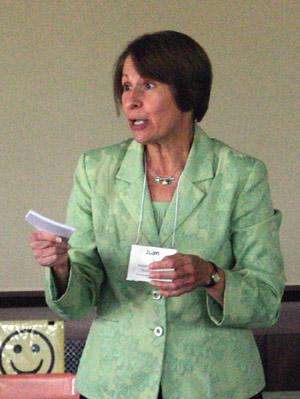
By Celine Klosterman
IOWA CITY — At the Davenport Diocese’s June Institute last week, about 50 people discovered strategies for connecting Catholic households with the Bible, learned about Church teachings on Scripture and found ways families can interpret the Word of God.
Joan Weber led a daylong workshop June 22 at St. Patrick Church in Iowa City for the annual institute, designed to give people knowledge and skills to be better catechetical leaders. She is project coordinator for lifelong faith formation services at the Washington-based Center for Ministry Development (CMD), which provides training, resources and consultation for pastoral ministry and catechesis.
Little time, lack of habit and other priorities keep Catholics from reading the Bible, U.S. parish and diocesan leaders said in a 2009 CMD survey. Church leaders haven’t encouraged use of the Bible at home enough, survey participants said.
But making Scripture primary in faith formation programs and making it simple and understandable would help, respondents suggested.
Weber said improving Bible literacy could involve having students practice finding a book, chapter and verse; playing Bible Jeopardy or Bible trivia; and familiarizing families with commentaries and concordances.
Interpreting the Bible
For Catholic families as a whole, she offered six ways to interpret Scripture. One is by becoming a storyteller — gathering people, proclaiming the Word and “breaking open” its meaning, all of which happen during Mass. Outside of the liturgy, Catholics could dramatize a Bible story or discuss how the story might have occurred in contemporary times.
Another method of interpreting God’s Word is becoming a “puzzle master” — someone who looks at the Bible’s big picture. Ask: What theological insight does a passage offer? How does it contribute to the big picture of salvation history? Create a poster with a salvation history timeline, workshop materials suggested.
Additionally, Catholics could interpret the Bible by acting as seekers — exploring the spiritual sense of the Bible and praying with Scripture. Weber offered a 12-step “family-friendly version” of lectio divina in which parents and children gather to read and reflect on a Bible passage and pray. She also suggested a Taizé-style prayer service, which includes repetition of simple chants, silence, proclamation of the Word and intercessory prayer. “This can be a profound experience of Scripture,” she said.
Families could also try connecting a significant moment in their lives to a Scripture passage, she said.
Weber later recalled a speaker who said the problem with his faith formation was that he had many “near-faith experiences,” but no true faith experiences. Catholics need to not just talk about the Bible, but read it; not just discuss prayer, but pray together, she said.
A fourth way to interpret Scripture is through the eyes of an advocate. Justice, service and compassion are biblical values, and we need to teach young people about them, Weber said. The catechist’s job isn’t to tell people what stance to take on an issue, but to give them the resources to determine what action Catholics are called to, she continued.
She suggested that when the Sunday Gospel has a theme of social justice, print a notice in the parish bulletin calling people to take on a specific “justice challenge” in their own lives. Or when the news covers injustices such as the Gulf oil spill, offer a related Scripture passage for reflection and discussion.
A fifth way to read the Word of God is as a student of literature. Teach people to read each book of the Bible in light of that book’s genre — such as letter, legend, poetry and love songs, or history, Weber said. Some people believe Genesis’ story of Adam, Eve and the apple must be taken literally, but a book’s genre may not lend itself to a literal reading, she said.
She later stressed that though the Bible is free of error in teaching the truth God reveals about salvation, it doesn’t need to be free of scientific or historical error to teach that truth. “I think we need to do a better job of teaching that sometimes,” she said.
Finally, Weber offered the interpretive method of a history detective. Readers need to understand the historical and cultural context in which a biblical book was written. She suggested giving parishioners the history behind a Sunday Gospel reading, for example, and shared a sample handout explaining farming practices for fig trees in the era Luke 13:1-9 was written.
‘Opening the door’
to life-long study
Wrapping up, Weber encouraged Catholics to use technology to promote learning about the Bible. On a parish’s website or on Facebook, post weekly questions or describe a “Bible hero of the month.” Also, take advantage of resources on the U.S. Catholic bishops’ website, www.usccb.org, such as daily Scripture readings.
After the workshop, Pat Schmida of St. Joseph Parish in Wellman said the day “has given me more thoughts about what I could do as an ordinary parishioner.”
Shirley Bohr, also a Wellman parishioner, said The Catholic Faith & Family Bible that participants received would definitely help her parish conduct a Bible study now that the Why Catholic? faith formation program has ended.
Trish Gallagher, pastoral associate for faith formation at Our Lady of Victory Parish in Davenport, said she was struck by the workshop’s “many ways of increasing familiarity with the Bible and really encountering the living Jesus there.” She said her parish has tried some of the strategies presented, and she knows they can work.
“Breaking down the fear of not knowing is what it’s all about.” Methods suggested “can do that while opening the door to continuing and growing life-long study,” she said.
For many more strategies for connecting Catholic families with the Bible and for a PDF of the PowerPoint slides from the workshop, visit www.cmdnet.org/biblehandouts.








